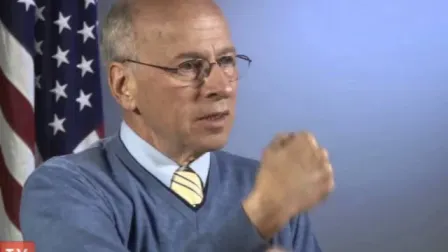
In 2008, conventional economics led us blindfolded into the greatest economic crisis since the Great Depression. Almost a decade later, with the global economy wallowing in low growth that mainstream economists also can't explain, they are reluctantly coming to realise that their models are useless for understanding the real world.
I realised that over 45 years ago, when I was an undergraduate student. Since then, I have worked tirelessly to develop an alternative, realistic economics. My book Debunking Economics has let tens of thousands of readers learn in one month the critical knowledge of economics that I spent four decades acquiring. The "complex systems" model of Hyman Minsky's "Financial Instability Hypothesis I developed in 1992 let me warn of the 2008 crisis before it happened. I designed Minsky, the Open Source dynamic modelling program, to make it possible for anyone to build and understand monetary models of the economy. My latest book Can We Avoid Another Financial Crisis? explains why the crisis happened, and what we have to do to end it. I have just developed the first explanation of production in which energy plays an essential role
https://www.patreon.com/ProfSteveKeen
Ignoring the role of private debt in an economy is like driving without accounting for your blind-spot
https://www.patreon.com/ProfSteveKeen
Steve Keen argues that neoclassical economists have a blind-spot when it comes to the role of private debt in macroeconomics. They should be worried by the incredibly high UK levels and be seeking ways to avoid the next crash.
As a car driver, you have surely had the experience of changing lanes and being beeped by a car with which you were about to collide—but which you didn’t see before the lane change. It’s because the car was clearly visible in your rear-view mirror, but that part of the image fell on your retina’s blind-spot—so you didn’t see it. Fortunately most of us learn that we have a blind spot, and so we check carefully to avoid being fooled by it again—and causing an avoidable accident.
If only economists could learn the same way, we might not now be in the accident of this never-ending economic crisis. “Neoclassical” economists (who dominate both academic economics and policy advice to governments) have a blind-spot about the role of private debt in macroeconomics, yet despite the economy crashing once before because of it during the Great Depression, they continue to argue that it’s irrelevant now—during this latest crash.
First, let’s establish that there was indeed a “car in the rear view mirror” in the 1930s and today. Data on long-term private debt levels is difficult to find, but I’ve located it for both the USA from 1920 till today, and for Australia from 1880 (see Figure 1). Clearly, there was a debt bubble before the Great Depression, and a plunge in debt levels during and after it (and Australian data also shows the same phenomenon during an earlier bubble and crash in the Depression of the 1890s; see Fisher and Kent 1999). The same process is clearly afoot again now.
Figure 1
Now for the blind-spot. Anyone not blessed—or rather cursed—by an economics education might think there was something in that coincidence of debt and depressions. But it’s nothing to worry about, leading neoclassical economists assure us—thus confirming that either they know something profound that proves that the coincidence is irrelevant, or that they have a blind-spot which means that their judgment can’t be trusted.
The profound insight they believe they have is that the level of debt doesn’t matter, and that only the distribution of debt can be important. Ben Bernanke rejected Irving Fisher’s “Debt Deflation” explanation for the Great Depression on this basis; after noting that Fisher did influence Roosevelt’s policies, Bernanke added that:
‘Fisher’s idea was less influential in academic circles, though, because of the counterargument that debt-deflation represented no more than a redistribution from one group (debtors) to another (creditors). Absent implausibly large differences in marginal spending propensities among the groups, it was suggested, pure redistributions should have no significant macro-economic effects…’ (Bernanke 2000, p. 24)
One crisis later, leading neoclassicals like Paul Krugman continue to argue that only the distribution of debt can matter:
People think of debt’s role in the economy as if it were the same as what debt means for an individual: there’s a lot of money you have to pay to someone else. But that’s all wrong; the debt we create is basically money we owe to ourselves, and the burden it imposes does not involve a real transfer of resources. That’s not to say that high debt can’t cause problems — it certainly can. But these are problems of distribution and incentives, not the burden of debt as is commonly understood. (Krugman 2011)

22:09

1:03:04

5:44

17:56

31:50

17:18

3:25

12:56

23:22

34:34